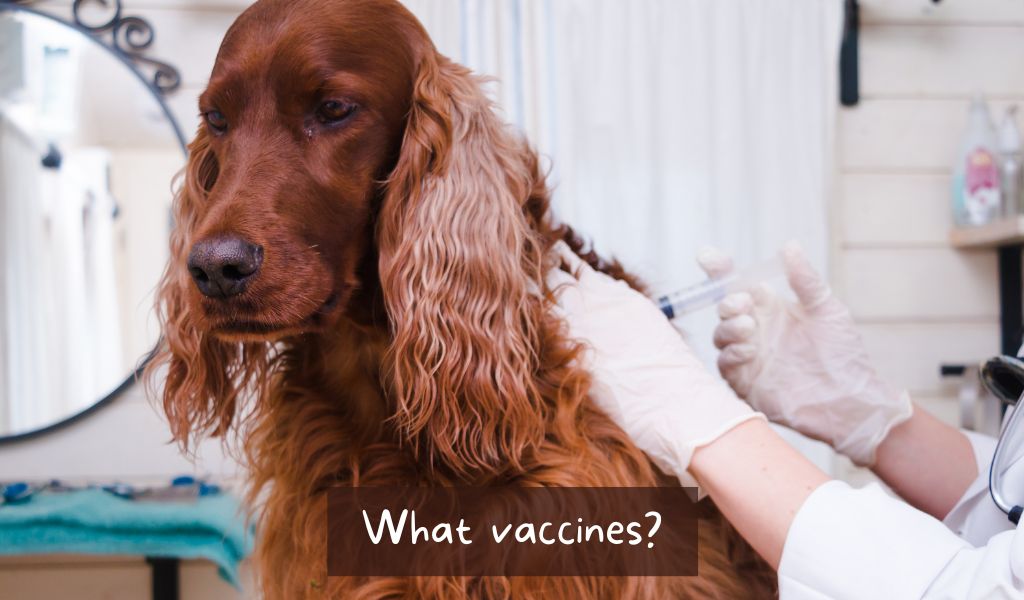Keeping your puppy healthy is one of the most important things you can do as a dog owner.
Vaccinations are an essential part of that process, helping to protect them from serious diseases and illnesses.
But it’s not just about getting the shots – understanding when, what type and how often vaccinations need to be administered is also key for keeping your pet in tip-top shape.
In this blog post, we’ll discuss everything you need to know about vaccinating puppies so that you can make sure they get the protection they need.
Vaccinations are an essential part of a puppy’s health care regime, as they help protect puppies from potentially dangerous diseases. Vaccination courses typically involve three injections, given four weeks apart and starting at 6-8 weeks old. The first shot is given at 6-8 weeks old, the second at 10-12 weeks old, and the third at 14-16 weeks old.
Why do puppies need vaccinations?
Puppies need vaccinations to help them build strong immunity against serious diseases.
Puppies are born with some immunity from their mother’s milk, but this only lasts for a few weeks.
Vaccinations give puppies the chance to create their own antibodies and fight off disease more effectively.
Vaccinating your puppy not only helps protect them, but it also helps protect other pets in your family and in the community.
Overview of vaccinations for puppies
Typically, puppies need a combination of core and non-core vaccines.
Core vaccines are those considered essential for all dogs, while non-core vaccines will depend on the lifestyle of your puppy – for example, if they’re exposed to other animals or if there’s a particular disease in your area that you might want to protect them against.
The core vaccines are the most important and typically include protection against the following illnesses:
It’s important to talk to your vet about the types of vaccinations your puppy needs to make sure they have the best possible protection.
Vaccinations at a glance:
•Newborn puppies receive disease-fighting antibodies in their mother’s milk, but these only last for a few weeks.
• Vaccinations are an essential part of a dog’s health care regime and help to keep them safe.
• Puppies usually have a course of three vaccinations, given four weeks apart.
• Dogs need booster vaccines every year from when they are one year old. Boosters help to protect your pet from infection.
Benefits of vaccinating your puppy
Vaccinating your puppy not only helps protect them against dangerous diseases and illnesses, but it also gives you peace of mind.
Vaccinations help to boost your puppy’s immune system and ensure they are better able to fight off any infections or illnesses that come their way.
It’s important to remember that vaccinations don’t just protect your puppy – they also help to prevent the spread of diseases, which is why it’s so important to make sure your puppy has had all their shots.
When to start the vaccination schedule
It’s important to begin vaccinating your puppy as soon as possible – usually at around 6-8 weeks old.
This is when puppies are most vulnerable to infection, so it’s important to start their vaccinations early but it’s best to check with your vet for specific guidance in regards to vaccine timing.
It’s common for a puppy to require multiple rounds of vaccinations before they are fully protected from potentially fatal illnesses, so starting early is key.
Talk to your vet about how often vaccines will be needed throughout the first year and make sure that you are on track for all scheduled appointments – these visits also help monitor your pup’s development and health.
How often should you get booster vaccinations for your dog?
Boosters for puppies should be given at least once a year.
This helps to ensure your puppy is protected from disease, as the effectiveness of the vaccine can reduce over time resulting in your dog being more vulnerable to infection.
Your vet will be able to recommend the best schedule for these, so make sure you discuss your options with them.
What to do if you miss a scheduled vaccine appointment
If you miss an appointment for your dog’s vaccination then make sure to contact your vet as soon as possible.
Depending on the length of time since your puppy’s last vaccine, the vet may need to restart the entire course.
It’s important that you don’t let too much time pass as doing so could put your puppy’s health at risk.
So make sure to stay on top of their vaccine schedule and talk to your vet about any missed or late appointments.
Final Words
Vaccinating your puppy is essential for their long-term health and wellbeing.
Vaccines give puppies the chance to create their own antibodies and fight off disease more effectively, so it’s important to make sure you keep on top of their vaccine schedule.
Talk to your vet about which vaccines are necessary for your puppy and remember that booster shots should be administered at least once a year.
Doing so will help protect not only your puppy but also the community, as it helps to prevent the spread of disease.










